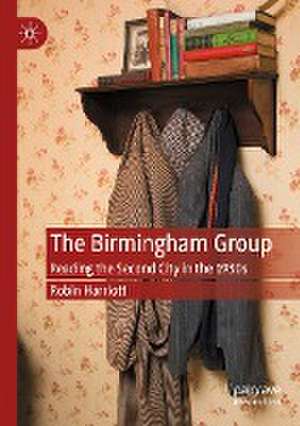The Birmingham Group: Reading the Second City in the 1930s
Autor Robin Harriotten Limba Engleză Paperback – 15 oct 2023
| Toate formatele și edițiile | Preț | Express |
|---|---|---|
| Paperback (1) | 627.82 lei 6-8 săpt. | |
| Springer International Publishing – 15 oct 2023 | 627.82 lei 6-8 săpt. | |
| Hardback (1) | 633.14 lei 6-8 săpt. | |
| Springer International Publishing – 15 oct 2022 | 633.14 lei 6-8 săpt. |
Preț: 627.82 lei
Preț vechi: 738.61 lei
-15% Nou
Puncte Express: 942
Preț estimativ în valută:
120.19€ • 123.61$ • 99.71£
120.19€ • 123.61$ • 99.71£
Carte tipărită la comandă
Livrare economică 18 februarie-04 martie
Preluare comenzi: 021 569.72.76
Specificații
ISBN-13: 9783031143854
ISBN-10: 303114385X
Ilustrații: XV, 290 p.
Dimensiuni: 148 x 210 mm
Greutate: 0.37 kg
Ediția:1st ed. 2022
Editura: Springer International Publishing
Colecția Palgrave Macmillan
Locul publicării:Cham, Switzerland
ISBN-10: 303114385X
Ilustrații: XV, 290 p.
Dimensiuni: 148 x 210 mm
Greutate: 0.37 kg
Ediția:1st ed. 2022
Editura: Springer International Publishing
Colecția Palgrave Macmillan
Locul publicării:Cham, Switzerland
Cuprins
1 Introduction: ‘They at Least Were Not Hybrids’.- A Multiplicity in Unity: The Birmingham Writers and Their City.- Shaping Influences: Finding the Exotic in the Everyday.- ‘Going Over’: The Cultural Diaspora.- ‘At last the British are Coming’: Prevailing and Contemporary Critiques of Working-Class Literature.- The Ethnographic Turn.- 2 This Working Life: Work and the Workplace.- A Fellow Traveller? Henry Green: Birmingham’s Adoptive Proletarian.- Walter Allen: ‘As a Film Director might present it’: Blind Man’s Ditch.- ‘As Unpolitical a Man as I Have Ever Met’: Leslie Halward.- Leslie Halward: ‘Belcher’s Hod’.- 3 Feeling the Pinch: Unemployment.- A Qualitative Deficit: Filling the Statistical Gap.- Walter Brierley: Frustration and Bitterness: A Colliery Banksman.- Walter Brierley: Means Test Man.- John Hampson: ‘Man About the House’.- Walter Allen: Innocence Is Drowned.- 4 Writing Their Selves: Subjectivity and Representation in Birmingham Group Narrative.-A Reluctant Collier? Walter Brierley: ‘Body’.- Walter Brierley: Sandwichman.- Leslie Halward: ‘A Broken Engagement’.- Peter Chamberlain: An Eavesdropper’s Secrets: ‘Mr. Marris’ Reputation’ and ‘What the Hell?’.- John Hampson: Saturday Night at the Greyhound.- 5 Conclusion.- Coda: Dispersal.- The Legacy.
Notă biografică
Robin Harriott holds the degrees of B.A. (Hons), M. Phil., and was recently (2021) awarded his PhD in English Literature from the University of Birmingham, UK. Formerly a teacher of English, he is now an independent researcher with interests in working-class writing and culture.
Textul de pe ultima copertă
The focus of this study is the collective of writers known variously as the Birmingham Group, the Birmingham School or the Birmingham Proletarian Writers who were active in the City of Birmingham in the decade prior to the Second World War. Their narratives chronicle the lived-experience of their fellow citizens in the urban manufacturing centre which had by this time become Britain’s second city. Presumed ‘guilty by association’ with a working-class literature considered overtly propagandistic, formally conservative, or merely the naive emulation of bourgeois realism, their narratives have in consequence suffered undue critical neglect. This book repudiates such assertions by arguing that their works not only contrast markedly with other examples of working-class writing produced in the 1930s but also prove themselves responsive to recent critical assessments seeking a more holistic and intersectional approach to issues of working-class identity.
Robin Harriott holds the degrees of B.A. (Hons), M. Phil., and was recently (2021) awarded his PhD in English Literature from the University of Birmingham, UK. Formerly a teacher of English, he is now an independent researcher with interests in working-class writing and culture.
Caracteristici
First extended study to explore the Birmingham Group, a collective of working-class writers active in the 1930s Challenges negative critiques of working-class literature, instead highlighting the unique contribution of these authors Shows how the Birmingham Group engaged with the intersections of class with gender, sexual and ethnic identities
